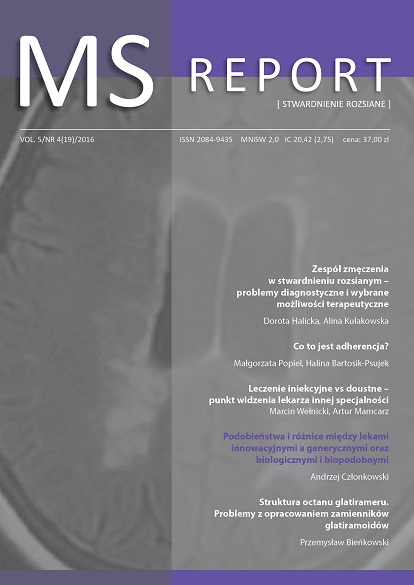Adherence – what does it mean? Review article
Main Article Content
Abstract
Multiple sclerosis (MS) is an inflammatory, degenerative, chronic autoimmune disease of the central nervous system. While there is no cure for MS, nowadays disease-modifying therapies (DMT) have become the standard for MS treatment. All of these DMT require regular, long-term administration by injection, but the route of administration and frequency of administration are different. Thus, adherence to therapy becomes an important challenge that must be addressed to maximize benefits of therapy. Adherence to therapy, defined by the World Health Organization (WHO) as the extent to which a person’s behavior corresponds with agreed recommendations from a healthcare provider, is crucial for patients to obtain the full benefits of their treatment. Treatment adherence is associated with better clinical and economic outcomes including lower risks for MS-related hospitalization, MS relapse, and less MS-related medical costs. This report evaluated rates of adherence to prescribed treatment and explored factors affecting adherence amongst patients with relapsing-remitting MS.
Article Details
Copyright © by Medical Education. All rights reserved.
References
2. Caporro M., Disanto G., Gobbi C. et al.: Two decades of subcutaneous glatiramer acetate injection: current role of the standard dose, and new high-dose low-frequency glatiramer acetate in relapsing–remitting multiple sclerosis treatment. Patient Prefer. Adherence 2014; 8: 1123-1134.
3. Hansen K., Schüssel K., Kieble M. et al.: Adherence to Disease Modifying Drugs among Patients with Multiple Sclerosis in Germany: A Retrospective Cohort Study. PLoS ONE 2015; 10(7): e0133279.
4. Devonshire V., Lapierre Y., Macdonell R. et al.: The Global Adherence Project (GAP): a multicenter observational study on adherence to disease-modifying therapies in patients with relapsing-remitting multiple sclerosis. Eur. J. Neurol. 2011; 18: 69-77.
5. Halpern R., Agarwal S., Borton L. et al.: Adherence and persistence among multiple sclerosis patients after one immunomodulatory therapy failure: retrospective claims analysis. Adv. Ther. 2011; 28(9): 761-775.
6. Tan H., Cai Q., Agarwal S. et al.: Impact of adherence to disease-modifying therapies on clinical and economic outcomes among patients with multiple sclerosis Adv. Ther. 2011; 28(1): 51-61.
7. Patti F.: Optimizing the benefit of multiple sclerosis therapy: the importance of treatment adherence. Patient Prefer. Adherence 2010; 4: 1-9.
8. Zettl U.K., Bauer-Steinhusen U., Glaser T. et al.: Adherence to long-term interferon beta-1b injection therapy in patients with multiple sclerosis using an electronic diary. Adv. Ther. 2016; 33: 834-847.
9. Bergvall N., Petrilla A.A., Karkare S.U. et al.: Persistence with and adherence to fingolimod compared with other disease-modifying therapies for the treatment of multiple sclerosis: a retrospective US claims database analysis. J. Med. Econ. 2014; 17(10): 696-707.
10. Menzin J., Caon C., Nichols C. et al.: Narrative review of the literature on adherence to disease-modifying therapies among patients with multiple sclerosis. J. Manag. Care Pharm. 2013; 19(1 supl. A): S24-40.
11. Zagmutt F.J., Carroll C.A.: Meta-analysis of adverse events in recent randomized clinical trials for dimethyl fumarate, glatiramer acetate and teriflunomide for the treatment of relapsing forms of multiple sclerosis. Int. J. Neurosci. 2015; 125(11): 798-807.
12. Lugaresi A., di Ioia M., Travaglini D. et al.: Risk-benefit considerations in the treatment of relapsing-remitting multiple sclerosis. Neuropsychiatr. Dis. Treat. 2013; 9: 893-914.
13. Devonshire V.A., Feinstein A., Moriarty P.: Adherence to interferon β‑1a therapy using an electronic self‑injector in multiple sclerosis: a multicentre, single‑arm, observational, phase IV study. BMC Res. Notes 2016; 9: 148.

